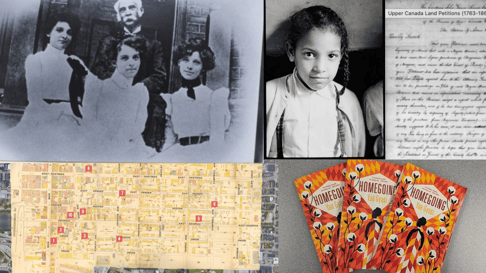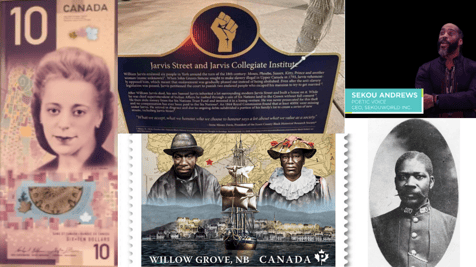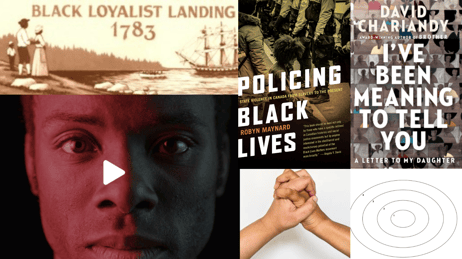This blog post outlines resources to use throughout Black History Month in February and beyond. This is by no means a comprehensive list (we continue to add to it as we discover new resources), but a list of resources that can be part of a professional and classroom journey that excites us to learn more, unites us in our common humanity and empowers students to champion a more equitable, compassionate, and informed tomorrow. [updated Feb 2026]
Part 1: Approaches and Mindsets
These on-demand webinars and resources have informed our learning on how to approach topics with culturally responsive and reflective pedagogy at the centre.
- The words of abolitionist educator Bettina Love:“there has to be love & strength & resilience” when teaching about difficult hist to ensure a full picture of the humanity of any group of people & that there can be pride in identity.
- Dr. Clint Smith reminds us that we honor our student when we give them full complexity of history. We can teach about resistance and strength while acknowledging the inhumane systems that Black people have had to overcome and still have to overcome on a daily basis.
- Dr. Daren Graves & Dr. Scott Seider helped inform our learning on how to approach topics with care & reflective practices. These pedagogical approaches empower educators and students to analyze, navigate and challenge racial injustice In talking about the tension that exists within critical consciousness, we need students to understand historical context and systems of oppression and also acknowledge Black identities, Black resistance, Black contributions and Black excellence.
- What happens when we support and empower students to bring history and identity into our school community? Where do you see opportunities to invite students to inquiry and co-planning into the curriculum?
-
Celebrating Black History Month is important but to create inclusive education spaces means incorporating Black histories, voices, and perspectives in every class, year round. Educators can do so by teaching thematically (i.e. Leaders of Challenge and Change in history; Arts in the 1920s in art, Canadian Innovators in science, Field Sports in physical education, etc.) incorporating Black Canadian voices, experiences, inventions, and featured scholars into curriculum; offering student choice for independent or small group work that includes Black Canadian representation (i.e. book club study, research project presentations); or offer units of study that centre questions for inquiry posed by leading Black Canadian authors, writers and academics.
-
Thank you to Pamela Donaldson, Associate Director of Equity and Inclusion at Facing History and Ourselves, for working on this with us:
.png?width=1600&name=Black%20History%20IsIsnt%20(2).png)
Part 2: Exploring Black Identities, Communities, Voices & Experiences
 An array of books featured on the front desk at a local Toronto Public Library branch
An array of books featured on the front desk at a local Toronto Public Library branch- Read about how Julius Lester defied others’ expectations on his journey toward understanding & defining his identity through discovering his voice in a book of haiku. How might we limit the way we think of identity? How can we challenge stereotypes?
- New York-based artist, Glenn Ligon, uses art to address the social constructs of race, language, sexuality & gender. Pair with the analyzing images, or Text-to-Text, Text-to-Self, Text-to-World with this thought provoking series to invite students to think about the factors that affect identity.
- What is the story of your name? In "Say My Name", poet Meleika Gesa-Fatafehi bears witness to the dignity of her name and Black, Indigenous, Pasifika, and West Asian heritage. Pair this poem with this lesson where students explore the relationship between names and identities.
- Chimamanda Adichie is a Nigerian writer who describes the effects that labels can have on how we think about ourselves and others in "The Danger of a Single Story". How can we challenge the single stories within ourselves & plan our courses with a balance of stories?
-
Read the works of poet Afua Cooper, one of Canada's most versatile poets of Afro-Caribbean origin. How does her voice connect, extend, or challenge students understanding of Black history in Canada, internalized racism and identity affirmation?
- Are you looking for ways to integrate Black Canadian history into your classroom? Natalie Steele, Ontario educator, outlines 4 free virtual resources to assist in enriching your existing history and social science lessons.
- Explore the National Film Board of Canada's collection of films by distinguished Black creators that portray the multi-layered lives of Can's diverse Black communities & showcase stories of strength & perseverance in the face of adversity that are often not found in history books
- Explore Historica Canada's resources on Black History in Canada or CBC Gem's Black Life: Untold Stories series
Part 3: Black Canadian History in Chronological Order
George Elliot Clarke, Canadian poet, novelist, playwright and critic reminds us:
"Knowledge of history is dangerous.
Knowledge of history is radical.
You understand history and no one can lie to you."

- A great way to introduce younger students to Black History Month is by streaming Ainora Alleyne's report for CBC Kids News on the history of Black History Month, and inviting students to create their own bio-poems or character maps highlighted in Akilah Newton's Mover's Shakers, History Makers
-
Black history in Canada began between 1600-1610, yet Black history comprises only 5% of some history texts. How will you create necessary space to learn about Black experience, contributions and achievements & discuss the largely untold histories of resistance? In this video, Ontario Black History Society blacked out all of the non-Black history from a 255-page history textbook. Only 13 pages remained.
-
There has been a steady stream of migration of Black people into Canada via Africa, Europe, the Caribbean, and the United States since the 17th century. Learn and teach about the history of migration through Library and Archives Canada.
- Learn about trailblazing Black Albertans whose stories as fur traders, entrepreneurs, restauranteurs, lawyers, ranchers, humanitarians and more begin in the 1770s and continue into the present; these stories are featured in the University of Calgary's "Black Albertans You Should Know"
-
Learn about the history of Black Loyalists from the Black Heritage and Loyalist Centre, the Book of Negroes and the founding of Shelburne and Birchtown in Nova Scotia in the 1780s. Take a look at some of the children's books available to learn about Black Loyalists, Africville and Birchtown
"When I think about the past, my concern about not remembering it, is not that we will repeat it if we don't remember it. My concern - my fear - is that when we don't remember the past, we will continue it. We will continue the things that created inequality and injustice in the first place. What we must do is we must disrupt the continuum of hard history. And we can do this by seeking truth. By confronting hard history directly... children [need to] understand where we have come from as a nation. And finally, we must all act on truth, individually, and collectively. Publicly and privately. In small ways, and in large ways. We must do the things that will bend the arc of the moral universe towards justice. To do nothing is to be complicit in inequality. "
- Hasan Kwame Jeffries, TEDX Ohio State University
- Hear from NS high school students who are part of a project to mark the historic exodus of Black Loyalists from Nova Scotia and remember its legacy. “What the seafarers endured and fought for is just as relevant today as it was on that January day in 1792.”
- Use the a BC Black History timeline as a foundation to invite students into new research that brings narrative voices and primary sources into a History class.
- Listen to the recorded poem 15 Ships to Sierra Leone written and performed by Dr. Afua Cooper. "In 1792, 15 ships sailed from Halifax to Sierra Leone carrying many Black Loyalists to Freetown. These people were some of the first settlers of Freetown, and many descendants of these families still reside there."
-
Chloe Cooley, an enslaved woman in Upper Canada resisted mistreatment from her owner. This precipitated the Act to Limit Slavery in Upper Canada, 1793- the first legislation in the British colonies to restrict the slave trade and reflected a growing abolitionist sentiment in British North America. Confront the history of Black enslavement and its maintenance through the police and judicial system in Upper Canada through this exhibition put together by the Museum of Toronto and the Ontario Historical Society
-
Take a virtual tour of Uncle Tom’s Cabin Historic with Steven Cook, Curator and Site Manager of the 5-acre museum complex in Dresden, Ontario. Learn about Josiah Henson and the 1830s Dawn Settlement.
-
What We Don’t Know About The History Of Slavery In Canada - Examining the limited scope of our education on slavery in Canada, the Toronto Star has a discussion with Dr. Charmaine Nelson the founding director of the Institute for the Study of Canadian Slavery. Read Dr. Nelson's work on the history of slavery in Canada and learn about why the institute is so important and a history that's been overlooked and understudied.
- Listen to this podcast, "One Too Many" where Natasha Henry discusses research on the enslavement of African men, women, and children in Upper Canada between 1760 and 1834." You can also read this article "Slavery in Canada? I Never Learned That!"
-
Established in 1850, the Buxton Mission school near Chatham, Ontario educated Black children from the nearby Elgin Settlement, where freed slaves had built a successful farming community. Anderson Abbott, the first Canadian-born Black doctor, attended this renowned school
-
This experimental short documentary as part of Toronto History Museums is directed by Teaunna Gray, an Afro-Indigenous director and film photographer. The documentary challenges what findings are held in reverence. In Sept 1851, St. Lawrence Hall in Toronto held the largest anti-slavery convention in history. Black leaders and educators joined to discuss: “What is the future of Black People in North America?”
- Learn more about Black History in Toronto through engaging primary resources from the city archives.
- Learn more about Black History in Niagara from Niagara-on-the-Lake Museum.
- Watch filmmaker Cheryl Foggo's documentary about John Ware, a pioneer of irrigation, recognized Southern Albertan, and Black cowboy
-
From the early 1900s to the late 1960s, the East Side neighborhood of Strathcona was home to Vancouver’s first and only Black community. The 10 video stories celebrate some of the people and places that made the community vibrant and unique.
-
Hugh Burnett, a Black World War II veteran who fought for civil rights through the 1940s and early 1950's in his hometown of Dresden, Ontario. In 1954 Hugh Burnett challenged discrimination and segregation in 'Jim Crow Ontario' through sit-ins at restaurants in Dresden that refused service to Black people.
-
In this recorded webinar Natasha Henry speaks about the not-so-distant history of Ontario’s racially segregated schools and the often unspoken actions taken by many Black parents who fought for the education their children deserved.natash
-
Read Natasha Henry's articles about the racial segregation of Black people in Canada and the racial segregation of Black students in Canadian schools.
-
Hogan's Alley in Vancouver- discover how this hotbed of historic jazz was nearly forgotten by time and erased by urban renewal. This short documentary uncovers the history of this multicultural neighborhood which held significant business & spaces for the Black community.
-
In the 1850s, in what is now Victoria, Governor James Douglas fought against American expansionism by bringing over hundreds of Black Americans from San Francisco. The legacy of this population is still felt today. Watch this streamable video "Rush to Freedom" to learn more.
-
How might a historical case study on the murders of 3 Black men in 1867-1868 in a community of 25 families help raise questions about racism, injustice and land expropriation in Canada? Explore Professor Ruth Sandwell's archives in "Who Killed William Robinson" on Great Unsolved Mysteries in Canadian History.
-
How do you include more authentic voices as you teach history to build empathy and compassion for the human experience? Educator Natalie Steele explains why and how she supplements missing voices through the use of historical fiction in this FacingCanada blog post.
-
This Canadian Encyclopedia collection offers featured articles, a timeline, videos & a photo gallery that focus on Black history in Canada.
-
ETFO’s latest project, the 365 Black Canadian Curriculum, is part of a compilation of equity resources for elementary educators which include a calendar and primary, junior and intermediate lesson plans.
Part 4: Legacy, Memory and Memorials

How do we remember and commemorate Black excellence and Black struggle in Canada?
- In this lesson, originally designed for Holocaust remembrance, students can propose new monuments, memorials or commemorations they would add to their community.
- What does it mean to hold public memory? This stamp commemorates Albert Jackson, Canada’s first Black postman who fled to Canada on the Underground Railroad and overcame discrimination to become Toronto’s, and the country’s, first Black letter carrier.
- How do we recognize & remember Black excellence? This $10 bill commemorates Viola Desmond who refused to give up a seat at a Nova Scotia movie theatre in 1946. What other civil rights leaders should we be placing a spotlight on for all Canadians to recognize?
- See how Canada Post honours two small communities with deep connections to Black History with commemorative stamps. Historian Ralph Thomas celebrates this as this is the first instance of Black people on stamps in New Brunswick
- How do we remember & commemorate Black struggle? Five temporary plaques exposing the history of the families behind some of Toronto's street names were spotted around the city in August 2020. How might students read this article and consider how else to uncover untold histories?
- JAYU has hosted and provided a platform for young and upcoming Black artists in Toronto to showcase their creativity, message and artistic abilities in the Here I Am exhibit. Ten special youth, coming from different backgrounds have created and produced artwork, ranging from poetry, music, photography and collaging that highlights this year's exhibition theme around the beauty in Blackness.
- Art is a powerful change agent. It can shift how we think about history, belonging, representation and how we imagine the future. Use Facing History's new Teaching Idea Art, Imagination, and the Quest for Racial Justice to explore how art intersects with the ongoing movement for racial justice in the United States.
- See CBC Gem's Black History Month Collection that celebrates Black stories and honours Black lives.
Part 5: Standing Up for Justice, Equity and Inclusion

- How the members of a group, a nation, or a community define who belongs and who does not has a lot to do with how they define their universe of obligation. Start a conversation with students about universe of obligation: Who is included in Canada’s? In ours?
- Hear from educator Natalie Steele as she reflects on her experiences as a Black female educator and shares her first encounter with discrimination at school in hopes that educators understand the impact that assumptions made on the basis of skin tone can have on individuals.
- Robyn Maynard's book Policing Black Lives traces the violent realities of anti-Blackness from the slave ships to prisons, classrooms and beyond. This is the 1st comprehensive account of 400+ years of state-sanctioned surveillance, criminalization and punishment of Black lives in Canada.
- David Chariandy's I've Been Meaning to Tell You: A Letter to my Daughter: "In sharing with his daughter his own story of "race," he hopes to help cultivate within her, as a child of black, brown and white ancestry, a sense of identity and responsibility that balances the painful truths of the past & present with hopeful possibilities for a more equitable and just future." -CBC.ca
Are any of your go-to resources missing from this list? If so, please share them in the comments
